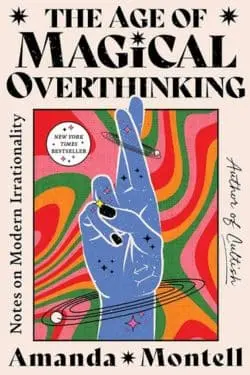Amanda Montell’s latest book, The Age of Magical Overthinking: Notes on Modern Irrationality, offers a captivating exploration into the irrational thought patterns that permeate modern life. As a linguist and acclaimed author of Cultish and Wordslut, Montell brings her sharp wit and keen analytical skills to dissect the peculiar ways our minds function in an age overwhelmed by information.
A Dive into Cognitive Biases
Montell organizes her book around twelve cognitive biases, each representing a different facet of modern irrationality. From the recency illusion to the sunk cost fallacy and confirmation bias, Montell illustrates how these ancient mental shortcuts have adapted, often maladaptively, to the digital age. Her writing effortlessly blends cultural criticism with personal anecdotes, creating a narrative that is both educational and deeply relatable.
For instance, in a chapter discussing the “halo effect,” Montell examines our tendency to project positive traits onto celebrities based on minimal evidence, a bias exacerbated by social media. This insight is particularly timely, highlighting how our constant digital engagement distorts our perceptions of public figures and reality itself.

The Impact of Information Overload
Montell argues that our brain’s coping mechanisms are overloaded in the current era, leading to an uptick in irrational behaviors. She likens this phenomenon to “magical thinking,” a term borrowed from psychological parlance, which refers to the belief that one’s thoughts can influence the real world. This type of thinking, while a useful mental shield in certain contexts, has become problematic in the face of relentless information streams.
Through meticulous research and engaging storytelling, Montell demonstrates how everyday interactions, from our social media habits to personal relationships, are shaped by these cognitive distortions. Her examination of the “sunk cost fallacy” in romantic relationships, where individuals continue investing in a failing partnership because of the time already committed, is both insightful and poignant.
A Balanced Perspective
While Montell’s work is not positioned as a self-help book, it offers readers a crucial shift in perspective. Her chapter on the zero-sum game of social media, where comparison breeds insecurity and competition, is particularly resonant. She introduces “Shine Theory,” a concept advocating for collaboration over competition, as a healthier alternative to navigating social media pressures.
Another standout chapter, “The Life-Changing Habit of Becoming a Mediocre Crafter,” delves into the “IKEA effect”—our preference for self-made items over store-bought ones. Montell’s personal tale of finding solace in furniture flipping underscores a broader call to disconnect from screens and engage in tangible, creative activities. This advice is timely for anyone feeling the burnout of constant digital engagement.
Critical Reception
Critics have praised Montell for her ability to blend humor with rigorous analysis. Publishers Weekly lauds her for making “astute connections” between various cognitive biases and their manifestations in modern life, though noting occasional overgeneralizations. Kirkus Reviews commends her for addressing how irrationality has gone mainstream, presenting complex psychological concepts in an accessible manner.
Final Thoughts
The Age of Magical Overthinking is a thought-provoking read that encourages readers to reflect on their cognitive habits and the broader cultural context that shapes them. Montell’s blend of cultural critique, personal narrative, and scholarly insight makes for an engaging and enlightening experience. Whether you are a long-time fan of Montell or new to her work, this book is a must-read for anyone looking to understand the quirks of the modern mind in the information age.
Also Read: The Next Mrs. Parrish: By Liv Constantine









